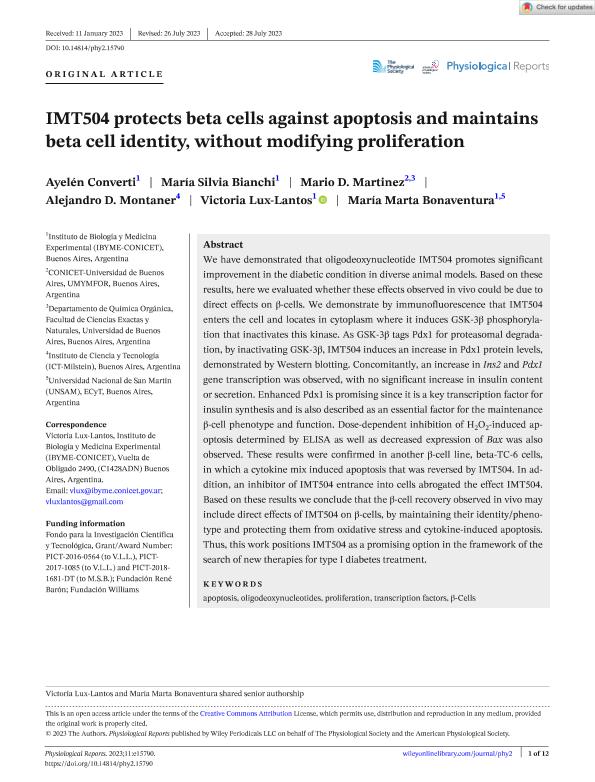Artículo
IMT504 protects beta cells against apoptosis and maintains beta cell identity, without modifying proliferation
Converti, Ayelén ; Bianchi, Maria Silvia
; Bianchi, Maria Silvia ; Martinez, Mario David
; Martinez, Mario David ; Montaner, Alejandro Daniel
; Montaner, Alejandro Daniel ; Lux, Victoria Adela R.
; Lux, Victoria Adela R. ; Bonaventura, Maria Marta
; Bonaventura, Maria Marta
 ; Bianchi, Maria Silvia
; Bianchi, Maria Silvia ; Martinez, Mario David
; Martinez, Mario David ; Montaner, Alejandro Daniel
; Montaner, Alejandro Daniel ; Lux, Victoria Adela R.
; Lux, Victoria Adela R. ; Bonaventura, Maria Marta
; Bonaventura, Maria Marta
Fecha de publicación:
08/2023
Editorial:
American Physiological Society
Revista:
Physiological Reports
ISSN:
2051-817X
Idioma:
Inglés
Tipo de recurso:
Artículo publicado
Clasificación temática:
Resumen
We have demonstrated that oligodeoxynucleotide IMT504 promotes significant improvement in the diabetic condition in diverse animal models. Based on these results, here we evaluated whether these effects observed in vivo could be due to direct effects on β-cells. We demonstrate by immunofluorescence that IMT504 enters the cell and locates in cytoplasm where it induces GSK-3β phosphorylation that inactivates this kinase. As GSK-3β tags Pdx1 for proteasomal degradation, by inactivating GSK-3β, IMT504 induces an increase in Pdx1 protein levels, demonstrated by Western blotting. Concomitantly, an increase in Ins2 and Pdx1 gene transcription was observed, with no significant increase in insulin content or secretion. Enhanced Pdx1 is promising since it is a key transcription factor for insulin synthesis and is also described as an essential factor for the maintenance β-cell phenotype and function. Dose-dependent inhibition of H2O2-induced apoptosis determined by ELISA as well as decreased expression of Bax was also observed. These results were confirmed in another β-cell line, beta-TC-6 cells, in which a cytokine mix induced apoptosis that was reversed by IMT504. In addition, an inhibitor of IMT504 entrance into cells abrogated the effect IMT504. Based on these results we conclude that the β-cell recovery observed in vivo may include direct effects of IMT504 on β-cells, by maintaining their identity/phenotype and protecting them from oxidative stress and cytokine-induced apoptosis. Thus, this work positions IMT504 as a promising option in the framework of the search of new therapies for type I diabetes treatment.
Palabras clave:
APOPTOSIS
,
OLIGODEOXYNUCLEOTIDES
,
PROLIFERATION
,
TRANSCRIPTION FACTORS
,
Β-CELLS
Archivos asociados
Licencia
Identificadores
Colecciones
Articulos(IBYME)
Articulos de INST.DE BIOLOGIA Y MEDICINA EXPERIMENTAL (I)
Articulos de INST.DE BIOLOGIA Y MEDICINA EXPERIMENTAL (I)
Articulos(IHEM)
Articulos de INST. HISTOLOGIA Y EMBRIOLOGIA DE MEND DR.M.BURGOS
Articulos de INST. HISTOLOGIA Y EMBRIOLOGIA DE MEND DR.M.BURGOS
Articulos(UMYMFOR)
Articulos de UNID.MICROANAL.Y MET.FISICOS EN QUIM.ORG.(I)
Articulos de UNID.MICROANAL.Y MET.FISICOS EN QUIM.ORG.(I)
Citación
Converti, Ayelén; Bianchi, Maria Silvia; Martinez, Mario David; Montaner, Alejandro Daniel; Lux, Victoria Adela R.; et al.; IMT504 protects beta cells against apoptosis and maintains beta cell identity, without modifying proliferation; American Physiological Society; Physiological Reports; 11; 15; 8-2023; 1-12
Compartir
Altmétricas



